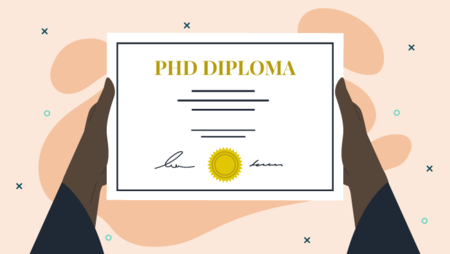
- Jul 22, 2022
- 11 min read

Is a PhD Worth It? The Pros and Cons of Getting a Doctorate
To get a PhD or not to get a PhD? That is the question.
Valerie David
Lifestyle and Career Expert
Reviewed by Hayley Ramsey

Entering the job market for the first time can be a stressful experience, especially if you don't feel completely prepared. When deciding how to take those first steps toward your ultimate career , and how to give yourself a chance at the best jobs, you may find yourself asking: “Should I do a PhD?”.
While academics looking forward to a life of learning may consider this a no-brainer, there are important factors for everyone to consider. Finances, job prospects and quality of life issues can greatly affect the success of furthering your education.
To help you decide if the time and effort of a PhD is worth it, here are the major benefits and disadvantages of getting that doctorate.
After four or more years of intellectual pursuits, adding a PhD may seem like overkill. Before you make your choice, let's look at all the benefits that are exclusive to earning the most advanced degree.
1. You can contribute new knowledge to the world
Embarking on a PhD programme means delving into your preferred subject in a much deeper way than you have in any of your previous studies. The beauty of this advanced degree is that it allows you to sail in uncharted waters. Your goal is to find new information, draw new conclusions and, hopefully, make a significant contribution to your field.
Your intensive research, travel, collaboration and study will lead you on an unpredictable path to telling a story that no one has heard before. For some students, this pursuit of knowledge and discovery is enough to make all the hard work of earning a PhD worth it.
2. You'll have access to more prestigious jobs
One of the key benefits of a PhD is that it opens doors to careers at the highest levels. This can include leadership positions in science and engineering, government roles in economics and political science, and prestigious teaching posts for English and arts majors. Even if an advanced degree isn't required for the job you want, that PhD can give you an extra air of authority in your field and an edge over other candidates.
Another obvious upside to continuing your postgraduate studies is that landing these powerful positions can lead to large financial rewards. Some areas of study, like medicine and the law, tend to be more lucrative, but it can also depend on the type of job. For example, a university professor or researcher post can pay well for a wide variety of disciplines. Check out sites like the Bureau of Labor Statistics and the National Careers Service to investigate potential salaries.
3. Employers look for candidates with your superior writing skills
A study arranged by the National Commission on Writing discovered that blue-chip businesses (long-standing companies with stable stock growth) are spending more than $3 billion a year on remedial writing course for current employees. This includes staff with undergraduate degrees.
So, when a hiring manager peruses your résumé and sees that you've earned a PhD, they'll know immediately that you've spent years honing your skills at compiling research, organizing mountains of data and writing about your results in a cohesive and persuasive way. This will clearly set you apart from your competition, while landing your dream job will prove that pursuing that advanced degree was worth it.
4. You'll improve on all your soft skills
While pursuing your undergraduate degree, you likely noticed that you were learning more than just the subject matter taught in each class. Completing your studies also required time management skills , focus and problem solving .
Getting a doctorate degree requires even more of the soft skills that employers look for in applicants . Your intensive study and finished thesis should lead to improvements in your problem solving, critical thinking , patience and adaptability . These desirable skills won't just help you land a job but also excel in whatever career you choose to pursue .
5. You'll collect an extensive network of professional colleagues
When weighing the pros and cons of earning a PhD, consider all the professional contacts you'll make during the course of your studies. Working closely with professors, department heads, experts in your field, as well as fellow researchers, helps you develop an important resource. This network of colleagues can provide continual assistance with references, job leads, career advice and collaboration.
6. You can wait for a more favorable job market
Job prospects may not look that promising when you've completed your undergraduate degree, or even after you've been in the workforce for a few years. While there's no guarantee things will improve after a delay, some students may appreciate the benefit of a steady graduate assistant salary while they work on enhancing their résumé with a doctorate.
If you couldn't get a good internship during or after your undergrad studies, the PhD work also gives you the time to build that professional network . These contacts could prove to be the key to breaking into a specialized or highly competitive field.
You may still be thinking about all that time and commitment and wondering, “Is a PhD worth it?”. While there are always positive results from improving your education, there are some downsides to getting your doctorate.
1. It's expensive
This is a substantial factor for many students when weighing the merits of pursuing a PhD versus entering the job market right away. If you already have student loans , continuing your education will just increase your burden and add substantial pressure when you eventually begin your job search.
If cost is a concern, investigate graduate assistant jobs that help with expenses. Some programmes offer tuition assistance in return for teaching or research work. For those who already work full time and are hoping a PhD will help them advance in their career, consider keeping that job and pursuing your studies on a part-time basis.
2. Getting a PhD can be a lonely experience
Despite your interactions with professors and other students, pursuing a doctoral degree is ultimately a solitary pursuit. Your thesis topic is unique to you, and you'll spend a lot of time alone doing research and writing. Your social life can suffer, especially if you're also working in addition to your studies.
Career experts often talk about the necessity of work-life balance for physical and mental health, and this is just as important for PhD students as anyone else. It may take you a little longer to complete your degree, but it's worth taking the time to visit family and hang out with your friends. These positive interactions can help you stay motivated through the most tedious parts of your work.
3. You'll experience extreme stress and frustration
Pursuing a PhD may seem like a noble and interesting endeavor, and extended life as a student can appear more attractive than wading into the job market. You must be aware, however, that getting a doctorate can be a very stressful and frustrating experience.
A topic that seemed intriguing at first may not live up to years of scrutiny, causing boredom at best or requiring a complete thesis change at worst. Not all programmes are well-run, either, and you may have a supervisor who is too critical, offers poor advice or is just unavailable and unhelpful.
The difficulties of a PhD programme lead to rather substantial dropout rates. In the US alone, only 57% of PhD students obtained their degree within a decade of enrolling. If you want to be in the successful half of those stats, take extra time to review your choice of supervisor and topic focus. Ask every professor you have for advice on making the right decisions and talk with current graduate students to see what their experience has been.
4. There may be limited job openings
While getting a PhD can qualify you for better and higher-paying jobs , it can also put you in a position where you're competing for an extremely limited number of job openings. This is especially true of university jobs, where the number of advanced degree graduates far outpaces the need for full-time instructors, researchers and administrators.
Earning your PhD with a very obscure thesis in a niche speciality can also limit your options. When there are only a handful of jobs that suit your expertise, and they're already occupied, it can make you feel that your doctorate was a waste of time. Consider the job market before you make decisions about getting another degree. If you're determined to study in a niche area, think ahead of time about related fields or industries where your knowledge and skills will also prove useful to employers.
5. There may be little to no financial reward
While most studies concur that having a PhD increases your income potential substantially over the lifetime of your career, it's not a guarantee of job security or a financial windfall. A study by the Organization for Economic Co-operation and Development (OECD) found that 5 years after earning their doctorates , 45% of grads in Germany were still on temporary contracts and 13% ended up in lowly occupations.
Other European countries, including Slovakia, Belgium and Spain, had similar results. In the US, in fields like engineering, the difference in pay scales between employees with a master's degree and a PhD was a mere 7%. When that small bump in salary is weighed against the amount of debt taken on in order to get your degree, you may decide it's not worth it.
6. You could lose out on valuable job experience
New forms of technology continue to change how organizations operate, and those changes can happen fast. If you've already spent several years in school, toiling away in solitary study of obscure subjects can cause you to fall further behind in learning the skills you'll actually need for a future career.
Before you invest in getting a PhD, research your chosen field and learn which type of degree will give you the most value. Many scientific, financial and computing careers rely more on skills acquired on the job, rather than in coursework that can quickly become outdated.
Questions to ask yourself
You’ve listed out the pros and cons, but that still may not be enough to help make your decision. When it comes to a life-altering change like getting a doctorate, it’s okay to take enough time to ask yourself specific questions to ensure you’re making the right move. Consider asking yourself the following:
- Why do I want to get a PhD?
- Do I have the pre-requisites to move forward to a PhD?
- What are my strengths and limitations?
- Am I financially prepared?
- Am I mentally prepared?
- How will this affect my relationship with my family or friends?
- Where will I study?
- What am I trying to achieve?
- What jobs will be available to me after I get my PhD?
- Are there other options or avenues to consider?
Unfortunately, you may not have the answer to every one of these questions, because let’s face it, you don’t know what you don’t know. You might not know how it will affect your relationship with family or friends, but why not ask them? Reach out to those closest to you and see how you pursuing this degree could trickle down to them and allow that to play into your decision. Evaluate the answers to these questions and use it to help you make an educated decision on your future moving forward.
The best PhD degrees
If you’ve weighed out the pros and cons, asked all the important questions, and now you’re set on getting your PhD, congratulations! To help you along the way, let’s look at a list of the most valuable PhD programs to start you on your way to this degree.
- Criminal Justice
- Engineering
- Cybersecurity
- Business Administration
These fields are rapidly growing and are among the highest-paying doctorate degrees in 2022 , so they might be worth considering as you start your journey.
Key takeaways
Pursuing your PhD requires an incredible amount of commitment, and it's important to take the necessary time to make the decision. As you’re evaluating a doctorate degree, remember the following:
- Evaluate the pros and cons list right from the beginning to ensure you’re weighing out both sides of the coin.
- Ask yourself the necessary questions. A doctorate degree commitment can affect more than just you, so be sure you’re factoring that into your decision.
- Review specifically which PhD would be best for you and your field progression.
- Research your chosen field carefully and evaluate the job market before you finalize your degree choice.
- Once you’ve selected your degree, stay focused and stay driven. It’s going to be a hard few years, but it will be worth the work!
Who knows, this may prompt you to move on to postgraduate study — never stop achieving!
Have you decided to pursue your PhD, or are you still considering your options? Join us in the comments below and let us know what’s stopping or encouraging you from getting a PhD.
Originally published on July 24, 2019. Updated by Shalie Reich.
Continuing Education
Courses and Qualifications
- Skip to main content
- Prospective Students
- Current Students
- Apply Apply
- Follow Us

The Pros and Cons of Getting a PhD

Getting a doctorate is a decision that will impact both your personal and professional life for many years to come. In this blog, we explore the benefits and drawbacks of attaining a doctoral degree, aiming to provide you with an unbiased view to help you make an informed decision.
Why Consider A PhD?
The benefits of a phd.
When it comes to enhancing your knowledge and contributing to your chosen field, few pathways can match the depth of a PhD. The benefits of a PhD extend beyond mere academic gains – they permeate each dimension of your professional enhancement.
1. Mastery in Your Field A PhD equips you with comprehensive knowledge about a specific area, amplifying your analytical, critical thinking and research skills to a level far beyond what a bachelor’s or a master’s degree could offer.
2. Opportunity for Ground-breaking Research As a PhD student, your primary role is to create new knowledge. The sense of fulfillment derived from contributing something novel to your field can be incredibly rewarding.
3. Networking Opportunities During your PhD program, you'll attend conferences and seminars, presenting you with opportunities to mingle with like-minded individuals, renowned academics and industry professionals, expanding your professional network substantially.
4. Enhanced Career Prospects With a PhD, a broader horizon of career opportunities opens up. You become a university professor, a leader in research organizations, or even a policy-maker influencing critical decisions in your field.
Practical Reasons to Get a Doctorate Degree
1. Societal Impact PhD holders can influence policy, promoting changes that positively impact society at various levels.
2. Teaching Opportunities For those passionate about educating others and impacting future generations, a Doctorate degree is often a prerequisite for higher-level academic positions.
3. Potential Higher Earnings A direct benefit of a PhD is the possibility of higher earnings over the course of your career, although this can vary considerably depending on the field.
The Flip Side: Challenges of a PhD
Just like any significant endeavor, getting a doctorate comes with its fair share of challenges.
The Cons of a PhD
1. Time and Financial Commitment A typical PhD can take 4-7 years to complete. Not only does this require a substantial investment of your time, it can also strain your finances. While scholarships and stipends may alleviate some costs, there is the foregone income to consider as well.
2. Pressures and Stress Levels The demands of a PhD — meticulous research, endless writing and frequent presentations — are often high. The intense pressure can lead to stress and burnout.
3. Work-Life Balance The long hours often required to complete a PhD can lead to a blurring of lines between work and personal life.
Practical Disadvantages of a Doctorate Degree
1. Over-Qualification Depending on your field, you might find potential employers outside academia who view you as overqualified, thus narrowing your pool of job opportunities.
2. Limited Practical Experience Dependent largely on theoretical work, a PhD sometimes lags in offering industry-specific training, which some employers may seek.
3. Opportunity Costs You should consider alternative achievements you might forego during the years spent on your PhD. This includes work experience, career progression, or even personal life events.
Making an Informed Decision: PhD or Not?
Deciding whether or not a PhD is worth it for you is a deeply personal decision, highly dependent on your long-term career goals and current life situation.
Evaluate your reasons to get a doctorate degree.
- Are you genuinely passionate about research?
- How essential is a PhD for your career aspirations?
- Are you ready for the financial implications?
Have you considered the opportunity cost?
Seeking advice from PhD holders, mentors, and career advisors can offer valuable insights in answering these questions.
The decision to pursue a PhD is undoubtedly complex and multifaceted. It requires careful consideration of both the benefits of a doctorate degree and its potential disadvantages. Ultimately, though, it is a personal decision. What is very clear is this: when used as a stepping stone for specific career goals, a PhD can be an exceptionally powerful tool.

learn more about what it takes to get a PhD
Explore our guide How to Get a PhD: A Guide to Choosing and Applying to PhD Programs.

Request more
Information.
Complete the form to reach out to us for more information
Published On
More articles, recommended articles for you, what is dispute resolution.
In an increasingly globalized world, the need for peaceful conflict resolutions is escalating....
What Does Fully Funded Actually Mean?
You may have heard that many PhD programs are fully funded — universities pay doctoral students to...
Funding Options for PhD Students
Pursuing a PhD is a significant commitment of your finances and time. From tuition, living...
Browse articles by topic
Subscribe to.
- Home »
- Blog »
The Pros and Cons of Getting a PhD
Find your perfect postgrad program search our database of 30,000 courses.
- by Charlotte King
- In Courses , PHD
Are PhDs only for those looking to stay within the world of academia?
If you’re feeling unsure whether a PhD is the right route for you , then check out our list of pros and cons below...
Pros of Getting a PhD:
You can indulge in the luxury of having Dr as your title . Yes it may sound a little superficial, but some of us like that kind of thing!
You’ll learn how to be tough (mentally tough that is) from all the grilling, criticizing, and second guessing you will have to endure when you present your research proposal .
Your analytical skills will sky rocket. This really depends on the type of PhD you pursue, but it is a given that you will learn to sharpen your analytical skills, and will then be able to apply these skills to subsequent ventures.
It is the highest possible degree that you can achieve. If you strive for greatness, and nothing short of being the best will do, a PhD will definitely fulfil your intellectual satisfaction.
You will be a recognized expert in your field, and you will have a piece of paper to prove it. Who knows, you may even be lucky enough to win a Nobel Prize one day!
Some jobs actually require you to have a PhD or equivalent, and no, they are not all academic jobs .
You will be able to use your PhD experience to quickly learn new areas within your chosen field, as well as adapt to the differing demands of the workplace .
Confidence. Studying for a PhD is a surefire way to boost your self confidence and belief. You will finally get the chance to discover that there is no secret source of knowledge that you’re being denied access too.
The joy of learning. If you pick a field that you enjoy (which is always advisable) the love of the pursuit will be enough.
Cons of Getting a PhD :
A PhD won’t necessarily help you get a job, unless it is research related that is.
Living, breathing, and thinking of nothing but your field of study for a prolonged period of time can make you think that this is all there is too life.
All your friends and colleagues are already on their second or third promotion by the time you’ve finally finished studying for your PhD.
Prospective employers may view you as overqualified and under experienced, especially if you try to venture outside of your field of research.
You will need to have a partner that understands you will be not only physically but also mentally absent as you attempt to make a breakthrough in your chosen field of study.
- You won’t have the luxury of a full time income , and once you graduate you will have a lot of catching up to do.
This blog was written using content from Jane Chin .
Related articles
The ABCs of PhDs Applying for a PhD course Top tips for surviving a PhD
Terman Sept. 28, 2021, 8:12 p.m.
I am looking for a PhD by publication, where my published works are related with the medical physics (MP) or statistics applied to MP. I see many of universities with this type of programm are of UK. Can you help me in my search??
Charlotte King Oct. 13, 2021, 9:03 a.m.
Hi Terman – many of the the top UK universities such as UCL and University of Exeter offer this type of program. I recommend you research into the PhD supervisors at the universities that you're interested in to help narrow down your choice. Good luck.
Leave a comment
All contributors must be over 16 year olds
By submitting your comment you agree to our privacy policy .
- Accommodation
- Coronavirus (Covid-19)
- Distance Learning / Online Study
- Infographic
- International Students
- Jobs and Careers
- Mature Students
- MBA Programs
- Personal Statement
- Student Life
- Student Welfare
- Study Abroad
- Study Advice
- Study In Australia
- Study In Europe
- Study In Ireland
- Study in UK
- Study In USA
- Theses and Dissertations
- Top 10 Lists
- Universities

Exclusive bursaries Open day alerts Funding advice Application tips Latest PG news
Complete Our Destination Survey

Take 2 minutes to complete our Destination Survey for the chance to win a Postgrad Study Bursary worth £2,000.
All we need to know is:
- Your university
- Your PG course
Why PhDs are good – for individuals, and for a country
Vice President of the Academy of Science of South Africa and DST-NRF SARChI chair in Fungal Genomics, Professor in Genetics, University of Pretoria, University of Pretoria
Disclosure statement
Brenda Wingfield receives funding from the Department of Science and Innovation in South Africa as she holds a DST/NRF research chair. She is a Professor at a South African University and is the vice president of the Academy of Science of South Africa (ASSAf).
University of Pretoria provides funding as a partner of The Conversation AFRICA.
View all partners

What is the value of a PhD? Is there a need in a developing world country to undertake a PhD study? It’s expensive (around R1 million per graduate) and in many regards a luxury for students from poor families. Even for those who have better access to money there’s a very real cost in tuition, costs of the research as well as years lost with regards to climbing the career ladder. As students in the southern hemisphere consider their study options for next year, it’s worth revisiting the pros and cons of doing a PhD.
From an individual perspective, there are good and bad reasons to do a PhD.
The good reasons include achieving a significant goal in terms of a research output, publications and in many cases solving an important problem. Doing research towards a PhD allows one to be curious, literally every day.
It’s also the first step in becoming part of the global network of researchers. Becoming part of a global community can be very gratifying.
The bad reasons would include the assumption that having a PhD will earn you a larger salary. This is not always the case. Another is peer pressure which can lead students to register for a PhD. Sometimes the pressure comes from family. Another not so good reason is when people decide to do a PhD because they don’t like the job that they are doing.
Undertaking a PhD study should only be considered if you are really passionate about research and understand that it really takes a huge amount of time and energy. It is after all the ultimate degree – there are none higher.
The value of a PhD
The bottom line is that there is no magic about the qualification. It doesn’t make you a better or smarter person.
However, people who have PhDs have shown a certain capacity and tenacity and have the degree to prove it. Many other people might have the equivalent capacity and tenacity but without the degree it is less easy for employers to identify them.
The South African government has identified that producing people with a PhD degree is an important goal. The Department of Science and Innovation has suggested that universities need to increase their output of PhD graduates to 100 graduates per million people. At the moment South Africa has 46 doctoral graduates per million people, this is one tenth of the figure for Switzerland (465) and United Kingdom (409).
The new target would take the expected output to more than 5800 PhD graduates every year. In 2016 the number of PhD graduates in South Africa was just under 3000 .
The government’s argument is that the PhD degree can be seen as a driver of the academic pipeline. If we focus on getting more PhDs, universities will also increase other graduates in the pipeline. While I support the idea of PhDs being a driver, I think that the current targets cannot be achieved for many years.
One cannot easily change the PhD pipeline quite so rapidly. In 2001 there were 802 PhD graduates, in 2009 this had increased to 1380 and in 2017 this had increased to 3057 , which has been a remarkable achievement. This is especially the case given the current global and local economic climate.
All countries need strong comprehensive universities – institutions that do more than just train students to the bachelor degree level. To have a substantive research output a university must have academics with PhDs. Only people with PhDs can train PhD graduates.
That does indeed mean building a vibrant PhD graduate training programme to support strong research output. South Africa is short of people with the appropriate qualifications (PhDs) to do the training. And it cannot expect to import such graduates to support its economy, because without strong comprehensive universities a country cannot train the range of graduates with skills necessary for sustained economic growth and development.
Quite a bit has been written about an over supply of PhD graduates. But this isn’t a problem in a country like South Africa where I have trained 52 PhD graduates, all of whom have found jobs. Not all are in academic positions, not all are still doing research. None of them have ever suggested that doing a PhD was a waste of time.
We need to train more, not less.
- Higher education
- Economic development
- South Africa
- Academic life

Senior Administrator, Property Contracts

Director of STEM

Community member - Training Delivery and Development Committee (Volunteer part-time)

Chief Executive Officer

Head of Evidence to Action
What is a PhD Degree? [2024 Guide]
As you’re taking a look at potential grad school programs, you might be asking yourself, “What is a PhD degree?”

Understanding what a PhD is and what’s involved in earning one can help you decide whether to enroll in this type of doctoral program. You might decide that a PhD is a strategic step for you to take to further your career.
Editorial Listing ShortCode:
If you choose to pursue a PhD, you’ll be glad to know that you can also earn this type of degree online through an accredited university.
What Is a PhD Degree?

After earning a bachelors degree and a masters degree, you may be considering taking your education even further.
The next step for you might be a Doctor of Philosophy degree, better known as a PhD. As a terminal degree, a PhD can set you apart as an expert in your field. Earning a doctoral degree is not a small undertaking. The process includes multiple steps and can last for several years.
Components of a Ph.D. degree program often include:
- Advanced courses in your chosen field
- Classes in research methods, data analysis, and scholarly writing
- Examination of current literature and studies related to your field
- Oral or written comprehensive exams
- Original research project—includes writing and defending a major paper about your research
The dissertation, sometimes known as a thesis, is usually the part of a PhD program that takes the longest. During the dissertation process, you’ll work under the supervision of a faculty advisor, often someone whose research interests correlate with yours. You’ll design a research project, carry it out, and write about your findings. This project is meant to contribute new ideas to your field.
A PhD is particularly suitable for students who love school settings and want to pursue academic careers. For instance, professors often have PhDs. It’s also common for scientists and other researchers to hold this type of degree. Outside of academia, a PhD could set you apart as a knowledgeable leader in your field.
Benefits of a PhD Degree

Getting your PhD can be an incredible personal goal worth achieving. Plus, a degree at this level can offer many professional benefits, such as:
- Career advancement . As a person with a PhD, you may be considered an expert in your field. That could help qualify you for a variety of top roles within your line of work.
- Higher earnings . A job promotion or a new employer might offer you a higher salary.
- Networking . You can meet new people and build professional connections as you work toward a PhD.
- Preparation for becoming a professor . Universities typically prefer to hire faculty members who hold PhDs in their area of expertise.
- Research opportunities . Before you can earn your PhD, it’s necessary to complete an original research project called a dissertation. After completing your degree, you may have additional opportunities to contribute research to your field.
If you’re willing to put in the work, then getting your PhD could be worth the effort.
How to Know If a PhD Is Right for Me

Before you sign up for a PhD program, it’s helpful to carefully weigh the decision and make sure it’s the right choice for you. You might ask yourself the following questions:
- Am I willing to commit years to the process ? PhDs take at least 3 years, and most take longer than that.
- Do I want to carry out original research ? This is a research-focused degree, and the purpose is to contribute new ideas or theories to your field.
- Does an academic career interest me ? Many people get PhDs because they want to work in higher education as teachers or researchers. Those who plan to remain as practitioners often consider professional doctorates instead.
It can also be helpful to speak with faculty members and current students to get a feel for what you can expect from PhD studies.
Applying for a Ph.D: Education Requirements

It’s necessary to put in years of study before you can apply for a PhD program. Most students need to hold at least two degrees already. But, in some cases, one may be sufficient.
- Bachelor’s degree . All graduate programs require students to have earned a four-year undergraduate degree before enrolling in advanced studies. Most PhD programs don’t specify that your bachelors degree must be in the same field as your hoped-for doctoral studies, but it can help you move through a graduate-level program with more ease.
- Master’s degree . Colleges often expect students to have earned a master’s degree before applying for PhD studies, but some programs do allow students straight out of bachelor’s degree programs. Doing a master’s degree first can provide strong preparation for the advanced coursework, research, and writing that are required in doctoral programs.
It is often required that the degrees you have be from accredited colleges. It may also be necessary to meet a minimum GPA requirement, such as a score of 3.0 or higher. Some colleges prefer PhD applicants who have graduated from previous programs with honors.
Doctor of Philosophy: Admissions Requirements

Doctoral programs can be quite selective about whom they admit because they’re looking for capable students who can keep up with the demands of the program and contribute valuable new research to the field.
In addition to meeting the education requirements, you’ll also be required to turn in records that demonstrate your academic potential. Here are some common admissions requirements:
- College transcripts and professional resume
- Letters of recommendation from people who know you academically or professionally
- Statement about relevant background, research interests, or professional goals
- Proposal that presents the original research project you’d be interested in doing
- Scores from the GRE or GMAT (not always required)
You might also connect with the department’s faculty members and find someone who would be willing to serve as your academic supervisor for your dissertation. It’s beneficial for this person’s research interests to align with your own.
Some schools have you do this before admission, and others connect admitted students to supervisors later in the enrollment process.
What Does PhD Stand For?

PhD stands for “Doctor of Philosophy.” It doesn’t mean that you’ve studied philosophy at the highest levels. Rather, the word “philosophy” in the name refers back to ancient Greek. It implies that you are someone who loves and seeks wisdom and knowledge.
You can get a PhD in many different subject areas—such as a Doctor of Philosophy in Mathematics or a Doctor of Philosophy in Psychology. PhD students explore their chosen field of study in great depth. They also learn how to conduct original research, and they undertake major research projects. By graduation, they are considered experts in their fields.
What Do You Learn in a Doctoral Degree?

In a PhD program, you’ll learn about your chosen area of study, such as biology or sociology. You will also study a niche area within that field in great depth.
Research is a significant topic in any PhD program. Your courses might include topics on:
- Advanced statistics
- Dissertation preparation
- Literature review
- Quantitative and qualitative methods
- Research methodology
These research-focused classes may be tailored to your particular area of study, such as research methodology in the social sciences or advanced statistics in criminal justice research.
What Can You Do with a PhD Degree?

Many people earn PhD degrees because they want to teach at the college level. This degree is often required for tenured faculty positions at universities.
The Bureau of Labor Statistics states that most postsecondary teachers earn between $46,690 and $172,130 each year. Research scientists often hold PhDs as well. Examples include medical scientists, biochemists, and physicists.
Additionally, there are some career paths that require a doctorate for licensure. For instance, clinical and counseling psychologists usually need to receive training at the doctoral level before they can practice independently.
Do You Need a Masters to Get a PhD?

Whether you’ll need a masters before you can begin the PhD process will depend on the program you choose.
Many PhD programs require a master’s degree as an admissions requirement. Completing a master’s program can provide a strong research and writing foundation that can help you during this advanced program. Other programs, though, let students enroll with only a bachelors degree.
There might be additional classes required to prepare you for working at the graduate level, so it may take a bit longer to complete your studies. For more information on whether you need a master’s to get a PhD , you can consult the admissions requirements of each program you’re considering.
Can You Get a PhD Online?

There are many online PhD programs available for aspiring students looking for flexibility. Some PhD programs are offered entirely online. You can take all of your classes online, and you can also receive guidance from your faculty advisor and defend your dissertation from afar.
Other programs are mostly online but require some in-person experiences. You might be asked to come to campus for a week or two of intensive study. Also, you may be asked to show up in person for your dissertation defense. Either way, online PhD studies are often more accessible for working professionals than fully on-campus programs.
How Long Does It Take to Get a PhD?

Students often spend 3 to 5 years completing a PhD program. Online programs sometimes include features like year-round classes and short course terms that encourage quick completion.
The shortest PhD programs typically do not involve writing a dissertation. There may be a different final assignment, such as a capstone project, instead. You might be able to finish one of those programs in about 3 years. Not all students finish within 5 years. Some spend around a decade on this massive undertaking. Some PhD programs set an upper limit for completion, such as 7 or 8 years.
Is a PhD a Doctor?

People with PhDs are considered experts in their fields, and the degree includes “Doctor” in its name. For that reason, PhD holders often use the title “Doctor.” A college professor, for example, might go by Dr. Smith.
Even still, there’s a difference between MD vs. PhD. A person who holds a PhD is not a medical doctor. Medical doctors earn a Doctor of Medicine (MD) degree before becoming licensed to practice medicine. In most contexts, though, people refer to professionals with PhDs as “doctors.”
What Jobs Can You Get with a PhD?

People with doctorate degrees work in both academia and professional practice. Being a college professor is quite popular among people who hold PhDs. The Bureau of Labor Statistics says that a PhD can also be helpful for obtaining jobs in higher education administration, particularly as a dean or a provost.
PhD graduates may work in research as well. Research jobs are available with colleges, government agencies, and private institutions. Researchers are needed in many different fields, including biology, mathematics, computer science, and economics. PhDs also help people rise to the top in their industries, perhaps as chief executives.
How Much Does a PhD Cost?

Some graduate schools charge just $300 to $400 per credit hour. Others may charge $2,000 per credit hour or more.
Per-credit-hour rates between $600 and $1,000 are quite common. It’s helpful to keep in mind that state universities often charge less for in-state residents than nonresidents. Your total number of credit hours may depend on how many years you spend working on your dissertation.
Some universities offer tuition-free PhD programs for qualifying participants. The students may even receive a stipend in exchange for research or teaching assistance. This arrangement is more common for on-campus programs than online ones.
What’s the Difference Between a Doctorate vs. PhD Degrees?
Is a PhD a doctorate degree ? For your terminal degree, you may have the choice between a PhD degree and a professional doctorate. While they are both doctoral degrees, they do have some differences.
Professional doctorates are sometimes a year or two quicker than PhDs, but that’s not always the case.
Is a PhD Worth It?

Yes, a PhD is worth it for many students. For one thing, holding a PhD could be the key to fulfilling your professional dreams.
If you want to be a professor, for instance, there’s a good chance that you’ll be required to have this advanced degree. Even if that’s not your ultimate goal, a PhD could be beneficial. The more education you have, the more your job security usually increases.
According to the Bureau of Labor Statistics, there’s an inverse relationship between education and unemployment. As education increases, unemployment rates decrease.
Getting Your PhD Degree Online

An exciting future as an expert in your field may await. You can earn a PhD to increase your knowledge, prove your capability, and contribute new ideas to your area of study. Getting this degree is an impressive accomplishment, and it may open new doors for your career. For convenience and accessibility, you might take a look at online PhD studies.
Many accredited colleges offer robust online PhD programs. You’ll get to take advanced courses and work with respected professors. An online program can also offer opportunities for completing a thesis or a doctoral project. You could graduate prepared to make a difference in your field.
Why not start exploring your options today?


What is a PhD?
- Types of Doctorates
- A Doctor of Philosophy (PhD) is the highest globally recognized postgraduate degree that higher education institutions can award.
- PhDs are awarded to candidates who undertake original and extensive research in a particular field of study.
- Full time PhD programmes typically last three to four years, whilst part time PhD programmes typically last six to seven years.
- A PhD can lead to an academia teaching role or a career in research. A PhD can also equip you with skills suitable for a wide range of jobs unrelated to your research topic or academia.
Definition of a PhD – A Doctor of Philosophy (commonly abbreviated to PhD , Ph.D or a DPhil ) is a university research degree awarded from across a broad range of academic disciplines; in most countries, it is a terminal degree, i.e. the highest academic degree possible.
PhDs differ from undergraduate and master’s degrees in that PhDs are entirely research-based rather than involving taught modules (although doctoral training centres (DTCs) offer programmes that start with a year of lecture-based teaching to help develop your research skills prior to starting your project).
In most English-speaking countries, those that complete a PhD use the title “Doctor” (typically abbreviated to Dr) in front of their names and are referred to as such within academic and/or research settings. Those that work in fields outside of academia may decide not to use the formal doctor title but use post-nominal letters (e.g. John Smith PhD); it’s unusual though for someone to use both the Doctor title and post-nominal letters in their name.
PhD vs Doctorate
A PhD and a professional doctorate are both research-based terminal degrees.
However, where a PhD focuses on original research mostly around theoretical concepts, a professional doctorate focuses on examining existing knowledge to solve real-life, practical problems.
While there is much crossover between the two, a PhD is generally better suited for an individual to wants to advance the knowledge and understanding in their field, and a professional doctorate degree is better suited to a working professional who wants to better be able to apply knowledge and understanding to their field.
What Are the Entry Requirements for a PhD?
To be accepted on to a PhD programme, students usually need to hold at least a high ( 2:1 and above ) undergraduate degree that is related to the field of research that they want to pursue. A PhD candidate may also be expected to hold a Master’s degree , however, this does not mean you must have one, as it is still possible to enrol into a PhD without a Master’s .
Self-funded courses may sometimes be more relaxed in relation to entry requirements . It may be possible to be accepted onto a self-funded PhD programme with lower grades, though these students typically demonstrate their suitability for the role through professional work experience.
Whilst a distance learning project is possible , most PhD candidates will carry out their research over at least three years based at their university, with regular contact with two academic supervisors (primary and secondary). This is particularly the case for lab-based projects, however, some PhD projects require spending time on-site away from university (e.g. at a specialist research lab or at a collaborating institution abroad).
How Long Does a PhD Take?
Typically, full-time PhDs last 3-4 years and part-time PhDs last 6-7 years. However, at the discretion of the university, the thesis writing-up period can be extended by up to four years.
Although most doctoral programmes start in September or October, they are generally much more flexible than taught-courses and can start at any time of the year.
How Much Does a PhD Cost?
Tuition fees for UK and EU students vary between £3,000 and £6,000 per year, with the average tuition fee of £4,712 per year for 2023/24 programmes.
Tuition fees increase considerably for international students, varying between £16,000 to £25,000 per year, with an average tuition fee of £19,600 per year .
Nonetheless, most students will secure PhD funding in the form of studentships, scholarships and bursaries to help pay for these fees. These funding opportunities can either be partial, which cover tuition fees only, or full, which cover both tuition fees and living expenses.
UK national students can also apply for Doctoral Loans from Student Finance England if they are unable to secure funding.
Finding a PhD has never been this easy – search for a PhD by keyword, location or academic area of interest.
What Does a PhD Involve?
To be awarded a PhD, a doctoral student is required to produce a substantial body of work that adds new knowledge to their chosen field.
A PhD programme will typically involve four key stages:
Stage 1: Literature Review
The first year of a PhD involves attending regular meetings with your supervisors and carrying out a search on previously published work in your subject area. This search will be used to produce a literature review which should set the context of the project by explaining the foundation of what is currently known within the field of research, what recent developments have occurred, and where the gaps in knowledge are. In most cases, this will be an extension of your research proposal should you have produced one as part of your application. The literature review should conclude by outlining the overarching aims and objectives of the research project. This stage of setting achievable goals which are original and contribute to the field of research is an essential first step in a successful PhD.
The supervisor is the main point of contact through the duration of a PhD – but remember: they are there to mentor, not to teach, or do it for you . It will be your responsibility to plan, execute and monitor your own work as well as to identify gaps in your own knowledge and address them.
Stage 2: Research
The second year (and prehapse some of your third year) is when you work on your research. Having identified novel research questions from your review of the literature, this is where you collect your data to help answer these questions. How you do this will depend on the nature of your doctoral research: for example, you may design and run experiments in a lab alongside other PhD students or visit excavation sites in remote regions of the world. You should check in regularly with your supervisors to update them and run any ideas or issues past them.
Have the structure and chapters of your thesis in mind as you develop and tackle your research questions. Working with a view of publishing your work will be very valuable later on.
Stage 3: Write up of Thesis
The next key stage of a PhD is writing a doctoral thesis , which typically takes from anywhere between three months to one year. A thesis is a substantial body of work that describes the work and outcomes of the research over the previous two to three years. It should tell a detailed story of the PhD project – focusing on:
- The motivations for the research questions identified from the literature review.
- The methodologies used, results obtained, and a comprehensive analysis and discussion of the findings.
- A detailed discussion of the key findings with an emphasis on the original contributions made to your field of research and how this has been impactful.
There is no universal rule for the length of a PhD thesis, but general guidelines set the word count between 80,000 to 100,000 words.
For your thesis to be successful, it needs to adequately defend your argument and provide a unique or increased insight into your field that was not previously available.
Stage 4: Attending the Viva
A viva voce , most commonly referred to as just a ‘ viva ‘, is an interview-style examination where the PhD student is required to engage in a critical appraisal of their work and defend their thesis against at least two examiners. The examiners will ask questions to check the PhD student has an in-depth understanding of the ideas and theories proposed in their thesis, and whether they have developed the research skills that would be expected of them.
The viva is one of the final steps in achieving a PhD, and typically lasts at least two hours, but this duration can vary depending on the examiners, the university and the PhD project itself.
Once you have done the viva – you’re on the home stretch. You will typically be asked to make some amendments to your thesis based on the examiner’s feedback. You are then ready to submit your final thesis for either:
- PhD – If you pass the requirements you will be awarded a PhD degree (most common outcome),
- MPhil – If you failed to meet requirements for a PhD, you may be downgraded to an MPhil degree (uncommon outcome),
- Fail – No award is given, typically for cases of plagiarism (extremely uncommon outcome).
What Is It Like to Undertake a PhD?
We’re often asked what it is like to undertake a PhD study. Unfortunately, this isn’t a simple answer to this question as every research project is different.
To help give insight into the life of a PhD student, we’ve interviewed PhD students at various stages of their programmes and put together a series of PhD Student Interviews . Check out the link to find out what a PhD is like and what advice they have to offer you.
What Are the Benefits of A PhD?
A PhD is the highest globally recognised postgraduate degree that higher education institutions can award. The degree, which is awarded to candidates who demonstrate original and independent research in a particular field of study, is not only invaluable in itself, but sets you up with invaluable skills and traits.
Career Opportunities
First, a PhD prepares you for a career in academia if you wish to continue in this area. This takes form as a career in the Higher Education sector, typically as a lecturer working their way to becoming a professor leading research on the subject you’ve studied and trained in.
Second, a PhD also enables the opportunity for landing a job in a research & development role outside of the academic environment. Examples of this include laboratory work for a private or third sector company, a governmental role and research for commercial and industrial applications.
Transferable Skills
Finally, in possessing a PhD degree, you can show to employers that you have vital skills that make you an asset to any company. Three examples of the transferable skills that you gain through a PhD are effective communication, time management, and report writing.
- Communication – presenting your work in written and oral forms using journal papers and podium presentations, shows your ability to share complex ideas effectively and to those with less background knowledge than you. Communication is key in the professional environment, regardless of the job.
- Time management – The ability to prioritise and organise tasks is a tremendous asset in the professional industry. A PhD holder can use their qualification to demonstrate that they are able to manage their time, arrange and follow a plan, and stick to deadlines.
- Report writing – Condensing three years of work into a thesis demonstrates your ability to filter through massive amounts of information, identify the key points, and get these points across to the reader. The ability to ‘cut out the waffle’ or ‘get to the point’ is a huge asset in the professional industry.
Aside from the above, you also get to refer to yourself as a Doctor and add fancy initials after your name!
What Can I Do After a PhD?
One of the most desirable postdoctoral fields is working within independent Research and Development (R&D) labs and new emerging companies. Both industries, especially R&D labs, have dedicated groups of PhD graduates who lead research activities, design new products and take part in crucial strategic meetings. Not only is this a stimulating line of work, but the average salaries in R&D labs and emerging start-ups are lucrative. In comparison, an undergraduate with five years of experience within their given field will, on average, likely earn less than a new PhD graduate taking on a R&D position.
It’s a common misunderstanding that PhDs only opens the door for an academic career such as university lecturers and training providers. Although obtaining a PhD opens these doors, the opportunities extend far beyond educational roles. In fact, recent data from the UK’s Higher Education Statistics Agency (HESA) indicates only 23% of PhD graduates take a position in educational roles . This low percentage is primarily because PhD graduates have a wide range of skills that make them suitable for a broad spectrum of roles. This is being seen first hand by the increasing number of PhD graduates who are entering alternative roles such as research, writing, law and investment banking.
How Do I Find a PhD?
We appreciate that finding a PhD programme to undertake can be a relatively daunting process. According to Higher Education Student Statistics , over 22,000 PhDs were awarded in 2016/17 within the United Kingdom alone. Clearly there are a huge number of PhD programmes available. This can sometimes be confusing for prospective doctorates, particularly when different programmes are advertised in different places. Often, it is difficult to know where to look or where to even start. We’ve put together a list of useful sources to find the latest PhD programmes:
- A great place to start is with our comprehensive and up-to-date database of available PhD positions .
- Assuming you are still at university, speak to an existing PhD supervisor within your department.
- Attend as many postgraduate open days as you can. Whilst there, speak to current PhD students and career advisors to get an awareness of what PhDs are on offer.
- Visit the postgraduate section of university websites and the PhD Research Council section of the UKRI website.
Browse PhDs Now
Join thousands of students.
Join thousands of other students and stay up to date with the latest PhD programmes, funding opportunities and advice.
- Faculty/Staff
- MyMichiganTech
- Safety Data Sheets
- Website Settings
- Graduate School
10 Reasons a Graduate Degree Pays

Are you considering getting a graduate degree? Whatever your reason is for deciding to hit the books again, you should know that there are several benefits of a graduate degree. As you consider a master's or doctorate degree, here are 10 reasons why pursing a graduate degree is beneficial.
1. Practical, Relevant Skills
This first benefit is probably the most obvious. Master’s degrees are specialized programs of study. A master’s degree will help you develop advanced, field-specific knowledge, skills, and training, which can help you progress within your current job or make you a more attractive hire to future employers.
2. Competitive Edge in the Job Market
A graduate degree may give you an advantage over other job applicants or land you the job itself. Back in 2016, the Harvard Business Review announced that according to a Career Builder survey, 27% of organizations are hiring only those with master’s degrees. That is, some positions, which previously required only a BS, may now demand an graduate degree. Along with thorough preparation, of course, additional knowledge from advanced education might help you succeed in one of the most stressful of situations: the job interview.

3. Increased Earning Potential
Having a graduate degree can significantly raise your salary. According to the Salary Survey of the National Association of Colleges and Employers, some master’s degrees lead to significant salary boosts , with business management and administration being included in the top four.
4. Mobility in Your Current Career
Supervisors appreciate employees who challenge themselves and who develop expertise that adds value to their organizations. A graduate certificate or degree may move you to the top of an internal candidate list.
5. Leadership and Management Roles
The specialized training, critical thinking, and focused skills developed with a graduate certificate or degree may qualify you to direct more complex projects. And many graduate programs, prioritize real-world professional skills, such as teamwork, management, and leadership . These aptitudes give you confidence to take on more responsibilities in the workplace while signaling to employers that you are definitely management material. Also, employees who excel at representing their companies often get more chances to travel.
6. Networking Opportunities
Graduate programs create learning communities; students build relationships with fellow students, professors, alumni, and other disciplinary experts. The professional connections, friendships, and networks you establish during graduate school can help you further hone your skills and grasp relevant opportunities. For example, Michigan Technological University alumni, some 70,000 strong, have access to many helpful resources and services.
7. Career Change
12.4: That’s the average number of times a person changes jobs in their lifetime, according to one career expert website. Maybe you’ve been on the job for two or even 10 years, but your interests have changed and you are seeking a new direction. A graduate degree may allow you to develop your previous education and/or capitalize on your professional experience, granting you more versatility (and options) on the job market.
8. Intellectual Growth and Transferable Skills
Despite the saying about the difficulty of teaching old dogs new tricks, you’re never too old to learn. Pursuing a graduate degree means you get to dive deeper into a subject that you love, or perhaps one that has haunted you from your early undergraduate days. You are going to develop competitive transferable skills that you'll be able to leverage throughout your career. Transferable skills are skills you can use in any professional setting to add to your career toolbelt such as project management, working with people, planning, developing processes and timelines, and organizing a team, volunteering, coding, freelance jobs, etc.
You’ll satisfy your love of learning and the goal of mastering a tricky subject while getting smarter. Yes, smarter. A recent study even found a correlation between achieving a higher education and warding off the effects of age-related cognitive decline. So you’ll grow your brain while contributing to the world’s bank of knowledge.
9. Increased Emotional Intelligence
Additional education also makes you smarter in other less obvious ways. Advanced education, when it improves your interpersonal, communication, and conflict-management skills, will enhance your emotional intelligence . Earning a graduate degree might help equip you with the traits of the most emotionally intelligent leaders.
10. Personal Satisfaction
Last but certainly not least, by earning an advanced degree, you’ll receive a sense of accomplishment from pushing yourself. Or, if life got in the way the first time around, you’ll gain the peace of mind of finishing something you started. Achieving a demanding goal brings increased self-esteem, which is not only one of the best advantages of completing graduate school, but also one of the biggest gifts you can give to yourself.
Master's vs. Doctoral Degree
Deciding between a master's or doctoral degree is a significant step in one's academic and professional journey. We've highlighted key differences between the two options, helping individuals navigate their choices effectively.
Depth and Breadth of Study
Master's and doctoral degrees vary significantly in the depth and breadth of study they entail. Doctoral programs typically require a deeper exploration of a specific subject area, with students expected to make original contributions to their field through extensive research. Master's programs focus on building advanced knowledge and skills within a particular discipline without the same level of original research expectation.
Research Emphasis
One of the primary distinctions between master's and doctoral degrees lies in the emphasis on research. Doctoral programs prioritize research, often culminating in the completion of a dissertation or thesis that contributes new insights to the field. While master's programs may include a research component, it is generally less extensive and may not always be mandatory for degree completion.
Master's degrees typically take 1-3 years to complete, whereas doctoral degrees require a more significant time commitment, often spanning 4-6 years, depending on the field of study and individual progress.
Autonomy, Independence, and Scope of Work
Doctoral programs typically grant students more autonomy and independence compared to master's programs. Doctoral students are expected to work more independently, take ownership of their research projects, and explore their research interests in depth. Doctoral programs encompass a broader scope of work. In addition to coursework, doctoral students may be required to pass comprehensive exams, engage in teaching assistantships, and conduct independent research. Master's programs may focus more narrowly on coursework and a final project or thesis.
Career Paths
While both degrees can lead to advanced career opportunities, doctoral degrees are often necessary for certain professions, particularly in academia or research-intensive fields. Master's degrees may suffice for other careers or serve as a stepping stone to further education, including doctoral programs.

Tomorrow Needs You
Whatever your motivation, if you’re ready to consider a master’s program and Michigan Tech is your school of choice, check out our Graduate School, which offers more than 99 certificates and programs .
We are a diverse, inclusive community of scholars, rising to society’s challenges in Michigan, the US, and the world. Students, faculty, and staff work closely across departments and colleges . If you are a prospective student, we invite you to further explore our PhD, MS, and certificate programs. Our combination of unique and exciting research opportunities and proximity to the beauty and wildness of the Upper Peninsula and Lake Superior provide a stimulating place to do what graduate students have always done—learn more, ask questions, and take on new challenges.
Michigan Tech’s Global Campus offers more than 40 in-demand online programs.
If your life circumstances prevent you from attending on-campus programs, know that there are flexible education options that let you work around your schedule.
Pursue an advanced education without stepping too far away from your life or from your job. Many of our online certificates may be completed in as few as two semesters. Michigan Tech’s online degree programs offer the same excellent education no matter where you are. Our online courses offer the same rigorous, research-based curriculum as our on-campus programs. You receive the same degree and diploma. There's no difference.
The Advantages Of Getting A PhD In 2024
Link Copied
Share on Facebook
Share on Twitter
Share on LinkedIn

Going Beyond the Status Quo with Your PhD!
The advantages of a PhD degree or, say, a doctoral degree can be reaped after a long and challenging journey. Now, you might wonder about the benefits of getting a PhD. There are actually many benefits, and we are going to discuss just that! So, let's dive right into it!
What Is A PhD & What Are Its Requirements?
A PhD is the highest academic degree that can be achieved. It demonstrates mastery of a subject area and expertise in research. It is a globally recognised postgraduate degree awarded to students who have submitted a thesis or dissertation based on thorough and original research in their field of choice. To apply for a PhD, ere are the general requirements:
1. Employment/academic references
2. Language proficiency
3. Personal Statements
4. PhD research topics and proposals (You have to explain everything about the topic of your PhD and how you will be doing your research)
Applying for a PhD can be a little tricky, but it doent have to be. If you want a guide on how to apply for a PhD, then here is a perfect roadmap on how to apply for a PhD .
Questions To Ask Yourself
Before you start finding your topic to apply for a PhD, there are a few questions that you need to ask yourself! If you don't ask these questions yourself, you might find it difficult to complete your PhD.
1. Am I passionate about it?
You need to remember that a PhD is a 3-4 year course, and if you are not passionate about it, then you will start struggling, but if you feel excited about spending 3-4 years on a particular subject, then you are ready for your PhD!
2. Do I have to get a research degree to pursue what I love?
Well, there are lots of jobs out there, and not all of them need a fancy Master's or PhD.
Think about what you're passionate about. Do you have any skills or knowledge related to it already? If not, would a research degree help you gain those skills or knowledge?
3. Am I ready for college again?
One question you need to ask yourself before applying for a PhD is whether you are ready to spend even more time in university since you have just completed your Bachelor's and Master's; attending university again can sound a bit dull and tiring since many prefer a change!
4. Have I found the perfect supervisor?
Every research student gets at least one supervisor. They're like mentors, helping you shape your ideas and gather your research. Finding the right supervisor is key to making your research shine. If they're connected to a research centre or group, you might get more support and resources. To find a good fit, you might need to look at different universities and contact supervisors directly. They usually mention if they're taking new students on their profile, and they're usually open to emails.
5. Can I afford it?
One final question that you need to ask yourself is whether you can afford to get a PhD since it can get a bit expensive, and if you are moving to a new country, things can become even more difficult. Fortunately, there are various best scholarships for PhD students available that help sponsor your PhD.
What Are The Benefits Of Getting A PhD?

Holding a Doctorate can be a prestigious achievement for students and professionals working in their respective fields. Holding a PhD also gives you the prestige of adding the “Dr” tag in front of your name. To answer your question about the benefits of having a PhD, here are some of the best PhD benefits that you must know:
1. Career advancement 2. Increased earning potential 3. Personal growth 4. Networking opportunities 5. Access to advanced research 6. Contributions to society 7. Increased knowledge and understanding 8. Improved critical thinking 9. Enhanced ability to conduct research 10. Helps you inherit transferable skills 11. It opens the door to career opportunities
Want to know more about the benefits of getting the PhD degree we mentioned above? Looks like we just heard you! Let us read about the benefits in detail below:
1. Career Advancement:
A PhD degree can greatly enhance your career prospects, particularly in academia, research, and science-related industries. The advanced skills and knowledge gained during the PhD program can make you a more competitive candidate for senior-level positions and can increase your earning potential. One of the main PhD benefits is career advancement. A PhD does not simply prepare you for careers in academia, as it is just a popular misperception,
2. Increased Earning Potential
The majority of PhD students receive financial support for their research in the form of a three-year studentship that pays their tuition and provides them with a respectable living allowance. Pursuing a PhD is comparable to working for three years at a salary. In many industries, a PhD student earns an average of 20% more than those with a Master's degree. Its increased earning potential is one of the major benefits of a PhD degree.
3. Personal Growth
Pursuing a PhD requires a great deal of hard work, determination, and self-discipline. The process of completing a PhD can be incredibly empowering and can help build self-confidence and increase your sense of self-worth. Personal growth is one of the important PhD benefits.
4. Networking Opportunities
The benefit of having a PhD is that it provides opportunities to meet and collaborate with other researchers, academics, and professionals in your field. Whether you are looking for a career or not, getting to know lecturers in your current or desired profession is a fantastic chance. These relationships can be valuable for future career advancement and can provide opportunities for ongoing collaboration and mentorship, making it one of the benefits of a PhD degree. If you want to know how you can network fast here are some of the best networking tips and tricks you need to know.
5. Access To Advanced Research
Another one on the list of PhD benefits is access to advanced research. By pursuing a PhD, you can make a major contribution to your field of study and society as a whole. Research findings and insights can impact public policy and help to solve important social and scientific problems.
6. Contributions To Society
Pursuing a PhD provides a deep and comprehensive understanding of a particular subject. The research experience and training you gain during the PhD program can help you develop critical thinking and problem-solving skills, and it also helps develop creative solutions to complex challenges. One of the PhD benefits which contributes to society is having the knowledge and expertise gained by studying can help you contribute to the greater humankind and society.
7. Increased Knowledge And Understanding
The research experience and training gained during a PhD program can improve your and problem-solving skills. It can be valuable in both personal and professional settings. Gaining vast knowledge and competence in your profession is one of the benefits of a PhD. You can help others by imparting your knowledge, which is not merely theoretical but also helpful in problem-solving. Because you are an authority and specialist in your field of study, friends, coworkers, and even the media will greatly appreciate your informed opinion.
Optimize your PhD journey with stays close to top university
Book your student accommodation through amber today!
8. Improved Critical Thinking
Pursuing a PhD provides advanced training in research methods and techniques, which can help improve one's ability to conduct research effectively. It can be valuable in both academic and non-academic settings. Critical thinking is one of the PhD benefits that will help you professionally and personally.
9. Enhanced Ability To Conduct Research
One major benefit of getting a PhD is that it can provide opportunities for further education and career development, both within and outside of academia. It can also help open up new opportunities for research, teaching, and mentorship. The enhanced ability to conduct research is indeed one of the important benefits of a PhD degree.
10. Helps You Inherit Transferable Skills
One PhD benefit is that you will acquire transferable skills while pursuing your PhD in addition to specialised knowledge in your subject, which you can use for any career route you decide to choose. Learning effective research techniques and note-taking techniques is a crucial skill you can apply in most work settings.
Additionally, you will pick up crucial writing and presentation abilities, which is another benefit of a PhD. Candidates for jobs who excel at writing and who are at ease presenting the knowledge to coworkers are highly valued by employers. Every workplace demands effective communication, which consistently ranks among the top talents for successful workers.
Top Colleges for PhD
Here are some top colleges and universities known for their strong PhD programs where you can reap the benefits of a PhD degree across various disciplines:
1. Massachusetts Institute of Technology (MIT)
MIT is renowned for its PhD programs due to its cutting-edge research facilities, esteemed faculty, and commitment to innovation. Its interdisciplinary approach fosters groundbreaking discoveries and attracts scholars seeking top-tier doctoral education.
2. Stanford University
Stanford University is renowned for its PhD programs due to its exceptional faculty, cutting-edge research opportunities, and vibrant academic community, attracting scholars worldwide seeking top-tier education and research experiences.
3. Harvard University
Harvard University's reputation for academic excellence, research opportunities, and renowned faculty members makes it a top choice for PhD candidates seeking rigorous scholarly pursuits and access to world-class resources.
4. University of California, Berkeley
The University of California, Berkeley is popular for PhD programs due to its renowned faculty, cutting-edge research opportunities, and a supportive academic environment. Graduates benefit from prestige, networking, and career advancement opportunities inherent in obtaining a PhD.
5. California Institute of Technology (Caltech)
Caltech is renowned for its rigorous academic environment and groundbreaking research opportunities. It offers PhD students access to cutting-edge facilities and world-class faculty. The benefits of pursuing a PhD at Caltech include unparalleled mentorship and the chance to contribute to impactful discoveries in various scientific fields.
Best Countries & Top Colleges For PhD
In conclusion, a PhD degree can have a significant impact on one's personal and professional life along with enhancing your student resume, and there are many advantages of a PhD. The advanced skills and knowledge gained during the PhD program can help to enhance one's career prospects, improve critical thinking and problem-solving skills, and provide opportunities for further education and career development.
Frequently Asked Questions
What is the benefit of pursuing a phd, what are the pros and cons of phd, what is the salary after phd, what are the types of doctorates, what is the scope of phd in management.
Your ideal student home & a flight ticket awaits
Follow us on :

Related Posts

10 Best Countries To Study Medicine: Eligibility, Fees & More!

Top 10 Research Topics For Students In 2024

The 15 Cheapest Countries To Study Medicine for International Students In 2024

amber © 2024. All rights reserved.
4.8/5 on Trustpilot
Rated as "Excellent" • 4800+ Reviews by students
Rated as "Excellent" • 4800+ Reviews by Students
PhD vs. Doctorate Degree: Benefits and Differences

Whether conducting studies to test the effectiveness of online teaching strategies or translating cutting-edge research into life-saving nursing practices, those with terminal degrees work at the top of their professions. As the pinnacle academic qualification offered within an area of study, terminal degrees prepare individuals to lead in their fields.
Considering whether to pursue a terminal degree, such as a Doctor of Education (EdD), Doctor of Nursing Practice (DNP), or Doctor of Philosophy (PhD)? It’s important to first understand the differences between a PhD and other doctorate degrees and the purpose that each serves.
What Are Doctorate Degrees, and Why Are They Beneficial?
A doctorate is a terminal degree that prepares individuals to take the knowledge they’ve developed in a subject area and apply it professionally. In other words, the degree focuses on helping professionals discover the practical applications of theory and research.
For example, a DNP can train individuals to translate medical research into improved nursing practices, which they then apply as nurse leaders. An EdD can empower people to take educational theories and integrate them into the curricula they develop or the teaching practices they use.
Those interested in pursuing doctorate degrees to level up their professional practice have many options. Today, many universities offer online doctorate degrees that allow professionals greater access and flexibility to achieve their goals.
For example, nursing professionals can select from various online DNP degrees designed to propel them to the top of their profession. These include programs for psychiatric mental health nurse practitioners , adult-gerontology acute care nurse practitioners , pediatric nurse practitioners , and others.
What can you do with an EdD? Educators considering doctorate programs can explore degrees, such as an online EdD in Higher Education Leadership, that prepare graduates to excel as academic deans, education consultants, or university presidents.
Doctorate Degree Benefits
Earning a doctorate degree offers numerous benefits, starting with improved job security. The labor force participation rate of doctorate recipients was 86.8% in 2021, compared to the national average of about 62%, according to the National Science Foundation.
Doctorate degree holders can also have greater earning potential than their counterparts. BLS data indicates that those with a doctorate degree earned a median annual salary of about $100,000 in 2021. That’s about 21% more than the earnings of master’s degree holders and around 43% more than the earnings of bachelor’s degree holders.
In addition to enjoying job security and higher salaries, doctorate degree holders have credibility, which can translate into leadership roles and greater authority in their field.
What Is a PhD, and What Are Its Benefits?
A PhD degree is a type of doctorate degree that prepares individuals to conduct high-level research in a specific field. Typically associated with administration and academia, the PhD degree empowers individuals to conduct original research that contributes to the overall body of knowledge in a particular area.
University professors, researchers, and scholarly writers typically hold PhD degrees in fields ranging from the hard sciences to the humanities. In addition to training individuals to conduct original research, a PhD prepares scholars in a discipline to critically evaluate theories, locate gaps in bodies of research, and assess the validity of emerging ideas.
PhD Benefits
Like other doctorate degrees, a PhD offers excellent job security, earning potential, and credibility. Additionally, a PhD can equip individuals to be forward-thinking leaders, performing research that advances their field. It also positions individuals to make a significant impact in a discipline through teaching and mentoring the next generation of experts.
PhD vs. Doctorate Degree: The Differences
While the PhD and other doctorate terminal degrees share similar characteristics, they differ in notable ways.
To begin with, the degrees employ distinct methods of study. PhD programs focus on preparing candidates to conduct original research. Other doctorate programs include research but are much less intensive. Instead, these doctorate programs concentrate on cultivating subject matter expertise for practical application.
For example, PhD students in nursing could conduct research that seeks to answer questions or find solutions to problems in nursing care. This could involve conducting randomized controlled trials to determine the effectiveness of a new method for dressing wounds after cardiac care.
In turn, DNP students could take the evidence from that research to develop a method for implementing the new wound dressing practice in clinical settings. The DNP students could also develop a process for assessing the effectiveness of that implementation.
Individuals who are interested in academics or research and are motivated by the prospect of making discoveries in their field will likely find PhD programs appealing. On the other hand, those inspired by opportunities to advance in their professional fields and put evidence into practice will likely find other doctorate degrees, such as an EdD or a DNP, a better fit.
Strive for the Top of Your Profession Today
Terminal degrees, such as a PhD or doctorate, are respected and prestigious. When planning your education and professional career path, understanding the distinctions between different terminal degrees and how they can each contribute to society’s body of knowledge and help it progress and thrive is important.
To learn more, explore the array of online degree programs at Maryville University , designed to support graduates reaching for the pinnacle of their professions.
American Speech-Language-Hearing Association, Considering and Pursuing a PhD in Communication Sciences and Disorders
Association for Public Policy Analysis & Management, Professional PhD Degrees for Public Service
Indeed, What Is a Doctorate? (And How to Get One in 3 Steps)
National Science Foundation, Survey of Doctorate Recipients, 2021
Nursing in Critical Care, “Randomized Controlled Trials in Critical Care Nursing: Essential to Move Practice Forward”
Seattle Post-Intelligencer, “What Is the Difference Between a PhD & Doctoral Degree?”
Seattle Post-Intelligencer, “What Is the Difference Between a Terminal Degree & a Research Degree?”
U.S. Bureau of Labor Statistics, Civilian labor force participation rate
U.S. Bureau of Labor Statistics, Employment Projections

Learn more about our programs.

Take your next step.
Privacy and cookies
We use cookies to give you the best experience on our website. By continuing, you're agreeing to use of cookies. We have recently updated our policy.

The Savvy Scientist
Experiences of a London PhD student and beyond
The Benefits of Having a PhD

If you’re on the fence about whether to do a PhD it can be helpful to understand the benefits that come from having one. As someone who completed their PhD just over two years ago I’ve been starting to realise some of the potential benefits but also realise some of the things that having a PhD doesn’t help with!
In this post we’ll cover all of the key benefits to help you decide whether studying towards a PhD would be right for you.
You may also wish to check out my post on whether a PhD is worth it for info on the pros and cons of studying for a PhD. This post you’re reading is about the benefits of having a PhD while the other is about the work involved within a PhD.
Will Having a PhD Help You Financially?
Money, the obvious starting point!
On average someone with a PhD appears to typically earn more than someone without a PhD, in the US at least. Unemployment rates on average are also the lowest of all education levels:

But, that doesn’t mean that this holds true for everyone in every scenario, and I’d urge caution against doing a PhD if your main motivation is financial.
If money is your main driving force and you’re highly motivated, it can often make better financial sense to land a graduate job straight after uni. In those years you’d otherwise be working towards a PhD you could be gaining industry-specific experience and climbing the career ladder. I’ve written much more about this in a few other places:
- Here in the ‘Masters vs PhD: Which is Right For You?’ post
- Here in the ‘Is a PhD Worth It? Should I Do a PhD?’ post
Bottom line: I don’t recommend doing a PhD for purely financial reasons. In fact, even if doing a PhD did always make sense from a purely financial perspective I’d still caution against it for a lot of people since the path to earning a PhD can be pretty involved.
What Are the Benefits of Having a PhD?
While a PhD won’t always necessarily land you a higher paying job, it does provide a series of other very tangible benefits.
For instance, gaining an incredibly in-depth knowledge of certain topics comes with the territory for PhDs. This knowledge can accelerate you towards becoming the world expert. Many PhD-holders use this knowledge, and the clout of having a PhD in it, to become domain experts who are called upon by news organisations, government agencies, and beyond to give opinion on topics of societal importance.
More widely, PhDs set you up for success by providing you with a series of transferable skills which can be applied to whichever career you choose.
In addition, having a doctoral degree can help you to stand out from other job candidates, giving you an edge for competitive positions. While your enhanced network can help you to find and secure such opportunities. Finally, having a PhD can also provide you with greater options, keeping more doors open for you to switch jobs in the future.

Let’s break down each of these benefits in more depth.
Domain Expertise
Having a PhD pretty much automatically makes you an expert in certain topics. How useful these expertise are really depends on what you chose to do your PhD in in the first place. Therefore don’t necessarily expect your new-found expertise to be regularly called upon by friends, family or even employers!
Nevertheless, being an expert clearly helps if it can be applied in a workplace or exploited to either help the world or make money (take your pick). Oftentimes in science and engineering this knowledge is valuable for companies. Providing consultancy to these companies could be a route to share your highly prized wisdom. We’ll come onto other skills you gain during a PhD shortly but I’ll mention them here too: even if your PhD is in a wacky niche seemingly of no use to employers, I’m sure you’ll have picked up loads of other skills which certainly are of value in the marketplace.
Furthermore, being an expert in something can bring responsibility and the power to shape public perception or drive forward policy. This is true for almost every PhD topic from energy to economics. PhD-holders in these domains, and many more, are often called upon by NGOs and governments.
If you want to demonstrate your expertise, you could do things such as publish papers or write content (think Medium or LinkedIn posts). If you’re in need of a helping hand, I have written a whole series of posts to help you write your first paper .
Stand Out in the Job Market
Having a PhD will help you to stand out from other job applicants when applying. This can make all the difference for sought after roles.
In addition to potential domain expertise and skills you’ve picked up, having a PhD demonstrates your commitment and capability to work independently which will be very valuable as an employee.
Can a PhD Ever Make it Harder to Get a Job?
I’ve occasionally seen comments online from people worrying that having a PhD may cause employers to reject them. I think the logic goes that due to having a PhD you may be unlikely to stick around for long in a position that doesn’t provide compensation reflecting that level of experience. Or that you may not be getting challenged enough intellectually.
Either way, I wouldn’t worry. Anecdotally my partner works for a large IT company and has met several people hired through their graduate scheme who have PhDs. Therefore, seemingly if a PhD doesn’t actively enhance your career progression at worst you’ll just be entering at the same level as recent graduates of undergraduate degrees.
I also wouldn’t worry that having a PhD would make you comparatively old since many people will work elsewhere before entering a grad scheme. My partner herself joined the grad scheme several years after leaving university.
While I can’t promise that every hiring manager will see a PhD as an asset, in general extra skills and experience should always be a bonus.
Many companies with grad schemes will use such schemes to find top talent with the hope that some will stick around to take on leading roles. There is therefore a large emphasis on your potential and having a PhD can demonstrate significant potential due to the skills we’ll cover next.
Gain Transferable Skills
Great researchers typically display the following characteristics, as covered in more depth here .
- Organisational Skills
- Open Mindedness
- Determination & Persistence
- Acting Logically
- Trustworthiness – acting with integrity
- Self-reliance
- Co-operation
If you’re interested in working towards a PhD you probably display many of these characteristics already and through studying for a PhD you’ll hone skills pertaining to several others.
On top of these characteristics and “soft skills” such as networking and communicating, there are all of the other skills involved with a PhD such as research, data analysis and presentation.
These transferable skills will be an asset to whatever role you choose to go into.
Let’s cover five of these skills in more detail.
Critical Thinking
Displaying open mindedness, curiosity and acting logically will all help to develop your critical thinking skills. A good PhD supervisor will give you enough freedom and support to allow your critical thinking skills to grow throughout your PhD. By the end you should be thinking independently and critically about your research domain.
Communication
Working co-operatively with other researchers, writing papers and presenting will help to enhance your communication skills. As an introvert I understand that putting yourself forward for presentations doesn’t come naturally to everyone, but I’d really suggest getting out of your comfort zone to improve your communication skills. A PhD is a nice supportive opportunity to get better at communicating with very little risk.
Time Management
Learning to stay organised during your PhD will help you to build skills in time management. If you aren’t already good at managing your time a PhD pretty much forces you to get better. Unlike undergrad coursework there is no way that you can complete a PhD with a series of all nighters!
Perseverance
Related to the last point about time management, PhDs are a marathon not a sprint. In order to reach the end you will need to display determination, persistence and patience. Overcoming these challenges leaves you well equipped with the know-how and resilience to tackle any future obstacles, no matter which career path you take post-PhD.
Proactive Mindset
Working independently and being self-reliant during your PhD will provide you with a proactive mindset. You’ll know how to take the initiative to do a task without being asked and that will be a fantastic asset in your future career.
Greater Career Options
You may decide to leave research to pursue a career in industry and that’s completely fine. The majority of PhD graduates do end up leaving academia and often make use of the transferable skills mentioned above to be successful in industry.
But choosing to do a PhD gives you the option to choose either way and should you decide that you wish to progress towards being a lecturer, or even one day a professor, you’ll already have the necessary qualifications and foundations for the experience you’ll need.
It’s important to note that jobs in academia are highly competitive, so there’s no guarantee that pursuing a PhD will mean you will definitely get a job in academia, but it is a prerequisite should you wish to do so.
A PhD also sets you up well for becoming a subject matter expert if you’re keen to pursue a specialised career in a particular field.
Enhanced Network
Working towards a PhD provides a brilliant opportunity to grow your professional network. Whether you choose to stay in academia or take the leap into industry this can prove invaluable. PhD-holders tend to go on to a hugely varied range of careers so can make for useful contacts.
Personally I’ve known people who’ve become academics and started their own labs, formed companies, worked at NGOs and gone into politics, alongside the more traditional career paths within industry. Yes, this pretty much describes many of the people you could meet during other types of degree but it seems that PhDs can turbo-charge the potential for impact for many of the reasons we’ve already covered.
I know of friends who have secured internships, and even permanent roles, after reaching out to former lab-mates who were able to recommend positions at their new companies. A personal reference goes a long way towards a company taking a chance on you.
Some PhD students also work with industry partners during their studies which can open doors to future roles and opportunities.
PhD Benefits Summary
In conclusion, while a PhD may benefit you financially under certain conditions it does have a whole host of other benefits which everyone can realise:
- Making you a subject matter expert with evidenced credibility
- Stand out from other job candidates
- Gain transferable skills
- Keep your career options open
- Grow your professional network
As for whether this makes studying a PhD worthwhile that will always be a personal choice.
For further insights I’d highly recommend having a read of my post ‘ Is a PhD Worth It?’ to learn the pros and cons of pursuing doctoral study.
Hopefully this post has helped you get one step closer to deciding whether to pursue a PhD. If you have any further queries on benefits of having a PhD just pop a comment below.
You can subscribe for more content here:
Share this:
- Click to share on Facebook (Opens in new window)
- Click to share on LinkedIn (Opens in new window)
- Click to share on Twitter (Opens in new window)
- Click to share on Reddit (Opens in new window)
Related Posts

The Five Most Powerful Lessons I Learned During My PhD
8th August 2024 8th August 2024

PhD Salary UK: How Much Do PhD Students Get Paid Compared to Graduates?
5th February 2024 4th July 2024

My top PhD regrets: 10 lessons learned by a PhD grad
21st April 2022 25th September 2023
4 Comments on “The Benefits of Having a PhD”
I am a teacher educator who have finished a BSc in science and a master in education management . What areas of topics are available for doing a phd in education and science related?
Thanks for your comment and interest in PhDs. I am sorry to say that I am not an expert in that field so do not know what exact topics may be available. They will of course vary a lot also depending on which supervisor, department and university you are interested in. My suggestion is to speak to the department where did your Masters to see what topics they suggest for a PhD as a starting point, and also to reach out to other universities and departments which may offer related degrees, for instance this one may be related to what you’re interested in? Although the course I link to is a Masters, they may know of supervisors who are looking for PhD students. I hope that helps. Best of luck
Hi I am an govt servent in Judicial Dept. I have completed BA MSW from KU Dharwad University. How the PhD helps if I’m pursuing….
Thanks for your comment Eranna. It is difficult to say for certain that a PhD will help with any particular job. Some job positions may require a PhD (which they will state in the job advert); Other positions may benefit from the skills acquired during the PhD (either technical or “soft” skills); Whilst for other positions the PhD may offer no benefit and time would be better spend gaining work experience. If career progression is the goal the person would be better off spending those 3-4 years working outside of academia rather than pursuing a PhD. So it really depends on the job and your career priorities. I hope this helps. Thanks, Jeff.
Leave a Reply Cancel reply
Your email address will not be published. Required fields are marked *
Notify me of follow-up comments by email.
This site uses Akismet to reduce spam. Learn how your comment data is processed .
Privacy Overview
PhDs and business leaders weigh in on the costs and benefits of getting your doctorate degree, and how to decide if it's the right move for your career
- A PhD can widen your career options, but you might want to consider the steep price of transitioning from corporate life to academic life before taking on an advanced degree.
- Business leaders and PhD holders shared with Business Insider their perspectives on PhDs and why they regret or didn't regret going back to school.
- Some experts said PhDs help you acquire research, writing, critical thinking, and presentation skills, but others believe it's a waste of time and money if you don't have long-term plans to teach or do research.
- While a PhD might be worth the investment if you want to work in science, math, engineering, or finance, the tech world is moving away from having the degree as a requirement.
- Experts also said prospective PhD candidates should consider the emotional toll of being away from friends and family.
- Visit Business Insider's homepage for more stories .

A PhD often brings prestige and career clout that can lead to bigger and better opportunities.
It can also be a strong test of your resilience and aptitude. Philippe Barbe, who has a PhD in math and has served as an invited professor at Yale and Virginia Tech, said that going back to school for your doctorate "is very much like training and running a marathon, a test of your will."
"Once you pass it, you know how far you can go," Barbe said.
But the degree also comes at a steep price. A 2019 infographic by Steve Tippins of Beyond PhD Coaching breaks down the myriad costs of a PhD, from tuition and fees to lost job opportunities and wages, reporting that PhD programs can set you back $30,000 a year on average.
Business Insider spoke with several business leaders and PhD holders to get their perspective on whether they're thankful for — or regret earning — an advanced degree. Here's what they said.
A PhD can boost your career in teaching and research and help you build transferable skills — but hold you back in certain corporate settings
In some fields, a PhD is a necessity for success. Barbe said that if you're interested in a highly technical industry, getting a PhD can open doors to an academic or research position in a renowned lab. For those in the corporate world, he added, it can help you lead "extraordinary technical teams and move toward high-level technical or non-technical management responsibility."
But some experts opined that having the degree can actually hold you back in certain career situations.
"I have had more than one HR manager, interview panel, and headhunter tell me directly that I would be best served when applying for executive jobs in the private sector by leaving the PhD off my CV," said Klay Dyer , the president of Dyer Educational & Research Consultants Inc. who left the academic world after 20 years of university teaching. "[It can] open doors in which the credentials will add cache or validation to an organization or project, and close them on many others when the perception is of over-specialization or of taking a private-sector job as a stop-gap or stepping stone."
He added that if the goal is to acquire additional transferable skills, then it can be a worthwhile investment. "My research, writing, critical thinking, and presentation skills have been valuable assets as I transitioned from academic to corporate to consulting life," he said.
Related stories
Read more: 8 accelerated MBAs offered by top business schools that allow you to get a degree quicker than at a traditional program
PhD-holder Mark Coster, an online entrepreneur and owner of the STEM-focused websites STEM Toy Expert and Organic Chemistry Explained , agreed that the degree is more useful in some roles than others.
"When I decided I wanted to do scientific research in chemistry, I saw that college professors and industry professionals all had PhD qualifications," Coster said. "More recently, since pivoting to online entrepreneurship, I see the majority of successful people online do not have PhDs in marketing or business."
Elisebeth VanderWeil, principal consultant at Hand in the Dark Consulting and a faculty member for Government Training, LLC , got her PhD when she heeded the call to teach.
She feels that her degree studies have served her well for not only teaching and research, but also in providing a robust foundation for consulting with diverse organizations. Nevertheless, she said that if your career plans don't involve a heavy amount of teaching or research, you shouldn't "waste time and money on a PhD."
A PhD can sometimes increase your earning potential, but comes with costs that go beyond the financial
Studies show that employees with a PhD can earn up to $20,000 more each year than those without one. Payscale reports that the average salary for those with a PhD is nearly $100,000 , and that some roles, such as data scientist and senior research scientist in biotechnology, can make north of that.
With stats like this in mind, Grant Aldrich, founder and CEO of educational platform Online Degree , said that in industries such as science, math, engineering, or finance, a PhD is worth the investment.
"For example, after getting a four- or five-year degree in pharmacy, you can work in a drugstore or open a pharmacy," Aldrich said. "The work you'll be doing is basic and not advanced, such as filling prescriptions. If you get a PhD in biopharmaceutical studies, however, you can have the opportunity to be an advanced scientist. Instead of merely filling prescriptions, you could be leading the synthesis of new drugs."
Aldrich said that the choice ultimately comes down to individual preference and what you want to get out of your career.
"If you yearn for more advanced, cutting-edge work, the only way to access it is to get a PhD," Aldrich said. "Also, you could get a salary increase that would make the investment worth it monetarily."
Read more: An inside look at the first 'mobile-friendly' accelerated MBA program, where aspiring entrepreneurs and leaders can earn their degree from their phones — without paying a cent in tuition
But Brian Trotter, CEO and founder of intellectual property consultancy Bishop Rock, LLC , isn't convinced of a PhD's value.
"While a PhD can get you a higher starting salary (maybe 10-15%), that will quickly disappear — high performers will quickly reach the same level independent of their highest degree," Trotter said. "When I was managing a team of designers, my best performers were not the engineers with PhDs."
Trotter told Business Insider that overall, he believes the tech world is moving away from the PhD as a requirement and that PhDs can have a reputation of "getting lost in the weeds in a difficult design problem."
Another consideration is whether you can afford to take time out of the workforce.
"Especially for those studying full time, PhD students should have a 'security blanket' to fall back on for the next four to seven years," said Brian Dechesare, founder and CEO of Mergers & Inquisitions , which offers investment banking courses for careers in finance. He recommended that prospective PhD candidates calculate outgoing and unexpected costs beforehand to ensure that they don't encounter financial trouble during their academic career, which could jeopardize their qualification.
Executive mentor and business consultant Anthony Babbitt, who's currently a PhD candidate in higher education administration and leadership, feels that time considerations are the most important factor in deciding whether to get a PhD, since the long degree can require social and familial sacrifices that may be even tougher than the financial ones.
"PhD programs tend to last three to eight years, so it can be a long haul," Babbitt said. "Student loans are relatively easy to obtain, so financing is usually less of an issue. [But] potential students will be making an enormous time commitment requiring time away from friends, family, spouses, and children."
Babbitt shared that for most of the people in his PhD program, this has been the hardest part.
"I did not start my program until my children were out of our home," he said. "The time factor is one of the reasons you see many people wait until their late 30s or early 40s before beginning. This delay is incredibly helpful since people have had time to work professionally, too."
He said he doesn't regret getting his PhD.
"Regardless of your field, a PhD will help your career in a variety of ways that do not always include more money," Babbitt said. "The people I talk with agree: The person who walks across the stage at graduation is much different than the person who entered the PhD program."
Watch: A top EY executive who has her pulse on what US business leaders are thinking says she's not worried about a recession
- Main content
10 Pros and Cons Of Ph.D. In Nursing

A Ph.D. in Nursing is considered a prestigious accomplishment, but is having one all that they say it is cracked up to be? Are you not sure if this is the path you want to go down regarding your nursing career? I think the first thing that you need to look at is, is what are the pros and cons of a Ph.D. in nursing? It is a lot to think about, so don’t worry, I took the work out of it for you. Below you will find the top 10 pros and cons of a Ph.D. in nursing. This article will definitely help you decide whether this is the right career path for you.
Top Cons of Ph.D. in Nursing
1. the cost of tuition, 3. you will not be able to practice in the hospital setting as a provider, 4. length of the program, 5. you will have to write a dissertation, 6. you must successfully defend your dissertation, 7. you may not be able to work full-time, 8. tenure is not guaranteed, 9. no more free time, 10. it is not a necessary degree, top pros of ph.d. in nursing, 1. increased salary, 2. no more 12-hour shifts, 3. no more weekends or holidays to be worked, 4. you have earned a prestigious title, 5. you can juggle anything, 6. you have earned the highest degree, 7. you can influence policy and practice change, 8. can you see yourself as chief nursing officer, 9. you can earn a prestigious job, 10. you will be regarded as an expert in your field, the bottomline.


IMAGES
VIDEO
COMMENTS
Pursuing your PhD requires an incredible amount of commitment, and it's important to take the necessary time to make the decision. As you're evaluating a doctorate degree, remember the following: Evaluate the pros and cons list right from the beginning to ensure you're weighing out both sides of the coin. Ask yourself the necessary questions.
The Pros and Cons of Getting a PhD - Advancing the Field
The joy of learning. If you pick a field that you enjoy (which is always advisable) the love of the pursuit will be enough. Cons of Getting a PhD : A PhD won't necessarily help you get a job, unless it is research related that is. Living, breathing, and thinking of nothing but your field of study for a prolonged period of time can make you ...
A Ph.D. is an advanced degree that students can use to maximize their expertise in a particular field. Offered in several disciplines, this is often the highest level of formal education a student can earn through universities and colleges. Ph.D. programs are often three to four years long where you'll perform tasks like research, writing and ...
Why a PhD is Worth it!
What Is a Doctorate?
The government's argument is that the PhD degree can be seen as a driver of the academic pipeline. If we focus on getting more PhDs, universities will also increase other graduates in the pipeline.
Benefits of a PhD Degree. Getting your PhD can be an incredible personal goal worth achieving. Plus, a degree at this level can offer many professional benefits, such as: Career advancement. As a person with a PhD, you may be considered an expert in your field. That could help qualify you for a variety of top roles within your line of work.
PhD graduates can also act as a bridge between universities and industry, helping to promote technology transfer and a knowledge flow in both directions." Whatever your academic area of interest, studying for a PhD degree is regarded as the very top of your field. The effort required studying for three, four or sometimes five years is enormous ...
Definition of a PhD - A Doctor of Philosophy (commonly abbreviated to PhD, Ph.D or a DPhil) is a university research degree awarded from across a broad range of academic disciplines; in most countries, it is a terminal degree, i.e. the highest academic degree possible. PhDs differ from undergraduate and master's degrees in that PhDs are ...
10 Reasons a Graduate Degree Pays
Use these steps to get a doctorate degree: 1. Earn an undergraduate degree. Complete an undergraduate degree program, preferably from an accredited university. While these degree programs typically take four years to complete, the time it ultimately takes depends on the number of credits you take and complete per semester.
The Advantages Of Getting A PhD In 2024
Earning a doctorate degree offers numerous benefits, starting with improved job security. The labor force participation rate of doctorate recipients was 86.8% in 2021, compared to the national average of about 62%, according to the National Science Foundation. Doctorate degree holders can also have greater earning potential than their counterparts.
Here are seven reasons earning a doctorate may be the right choice for you. 1. Advance Your Knowledge. By completing a doctorate program, you will have the opportunity to deepen your knowledge in your chosen field of study. Doctoral programs provide students with an advanced understanding of research methods, data analysis, and other critical ...
The Benefits of Having a PhD
2 Nature, Why earning a PhD is an advantage in today's industry job market in June 2021. 3 Taylor & Francis Online, To prove myself at the highest level: The benefits of doctoral study in June 2021. 4 Taylor & Francis Online, Teachers pursing a doctoral degree: motivations and perceived impact in June 2021. 5 The Journal of Stories in Science ...
A PhD can widen your career options, but you might want to consider the steep price of transitioning from corporate life to academic life before taking on an advanced degree. Business leaders and ...
Although it may be a difficult journey, the advantages that come with the degree and the skills you'll learn while completing the program are sure to be worth it. Keep reading to learn about some of the benefits of a PhD degree. Creates a Sense of Accomplishment and Credibility. Completing a PhD program is a respected accomplishment — and for ...
2. Gain New Skills. Students who complete a PhD in Education degree program become an expert in their chosen area of study which helps them stand out in the job market. Students complete coursework designed to train students how to conduct sound research in different areas of education. Students learn how to ask critical questions and design ...
This is no small accomplishment—and those in the field of education know it. The respect you earn by completing a PhD in Education is about much more than a title (although being called "doctor" feels good!). It signifies you have the expertise and know-how to be a leader, fostering positive, lasting change wherever your doctoral degree ...
A Ph.D. in nursing is not a practice doctorate. A Ph.D., on the other hand, is a research and science-focused degree that prepares nurses for careers conducting research that will advance the nursing profession and for teaching nursing at the college level. If you wish to diagnose and prescribe at the doctoral level, then the DNP degree is for ...
7 Advantages PhDs Have Over Other Job Candidates